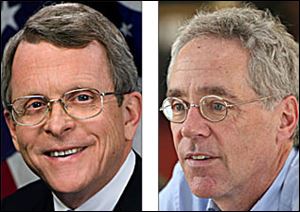
OHIO NEWSPAPER ASSOCIATION CONFERENCE
First Amendment lawyer says rulings eroding law on open records
2/15/2013
ASSOCIATED PRESS

Mike DeWine, left, and Blade counsel Fritz Byers have expressed concerns about recent court rulings.
COLUMBUS — If the current state of public records law were a student, Ohio should be worried that the once-star pupil is now in danger of failing, a First Amendment lawyer said Thursday.
“Ohio public record law is predicated on the inarguable proposition that public records are the public’s records, and that the incidental custodians — whether it be a civil servant or an elected official — are truly custodians and they operate as trustees for all of us in the custody and handling of those records,” Toledo attorney Fritz Byers, The Blade’s counsel in open government cases, said at the convention of the Ohio Newspaper Association.
Ohio is generally considered to have one of the strongest public records or “sunshine” laws in the nation, but Mr. Byers expressed concern that some recent court rulings, including some by the Ohio Supreme Court, have begun whittling away at public access to its own records.
Attorney General Mike DeWine described the current state of open records law to be “inconsistent,” particularly in terms of its implementation at the local government level, where officials sometimes don’t understand the law or don’t want to understand it.
“I think the state of the law is good,” he said. “I think the public policy of the state is by and large good. I think the Supreme Court decisions have been very clear about which way we should go. The devil’s always in the implementation. I think the challenge is on a case-by-case [basis]. Part of it is education.”
The Ohio Supreme Court has seemingly come down on both sides of the issue in the eyes of journalists. In 2006, it recognized for the first time a governor’s ability to assert executive privilege in shielding some records from public view.
Two years later, it issued a groundbreaking decision that an electronic public record doesn’t cease to be public record if it is deleted, a response to a lawsuit filed by The Blade to access records of the Seneca County commissioners related to the eventual demolition of the historic 1884 courthouse in Tiffin.
The Blade won a lawsuit against the University of Toledo Foundation in 1992, in which the court ruled 6-1 that the university had to release records on the private nonprofit, which received public money and performed a public function.
But in 2005, the court, by a vote of 4-3, established a four-pronged test seen as weakening that stance. It found that the nonprofit Oriana House, which operated Summit County’s community corrections program, was not subject to the public records law despite its receipt of government money to perform some functions of government.
“The idea that by delegating a public function to a private body that you can then insulate the discharge of that function from public scrutiny does again strike at the heart of governmental accountability ...,” Mr. Byers said. “This again is the Supreme Court changing the law and substituting a complex and unwieldy test for a simple test that has just caused more problems in its application for no reason.”
The 1992 UT decision consisted of three Democratic justices joining with three Republicans in the majority and leaving a sole Republican dissenting. The 4-3 Oriana decision divided what was by then a 6-1 Republican court, as it is today. Four Republicans made up the majority while the sole Democrat joined two other GOP justices in dissenting.
Some of the same questions about private entities have more recently been asked about JobsOhio, the nonprofit created by the state of Ohio that has received state money to perform economic development functions.
Knowing his audience, Mr. DeWine said that newspapers can attempt to influence public opinion whenever lawmakers weigh changes to the law.
“You still buy ink by the barrel,” he said.
Contact Jim Provance at: jprovance@theblade.com or 614-221-0496.